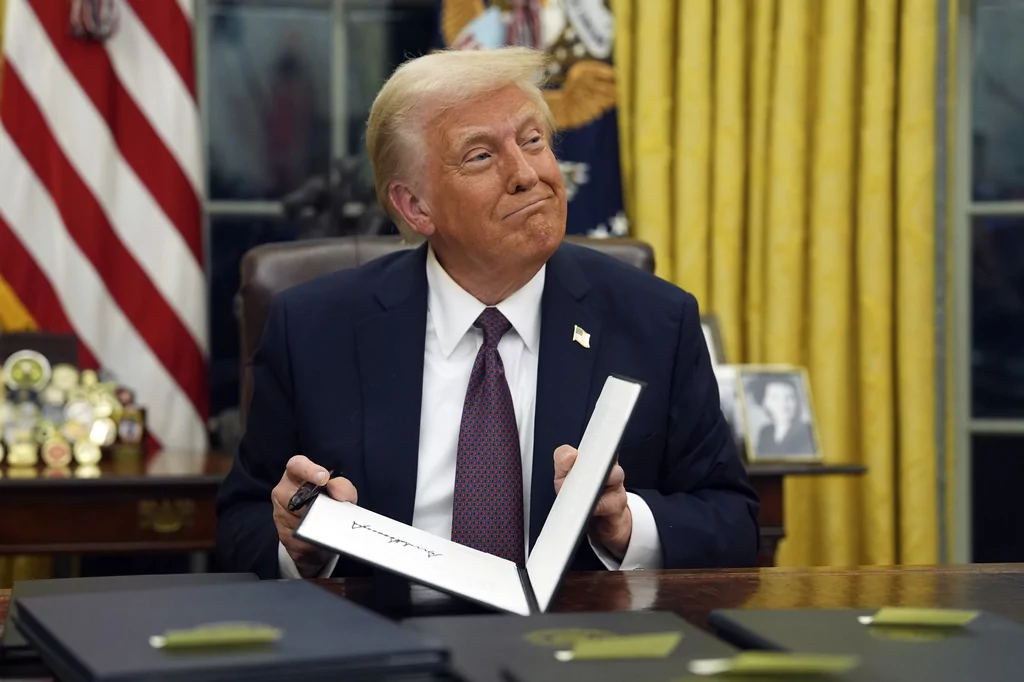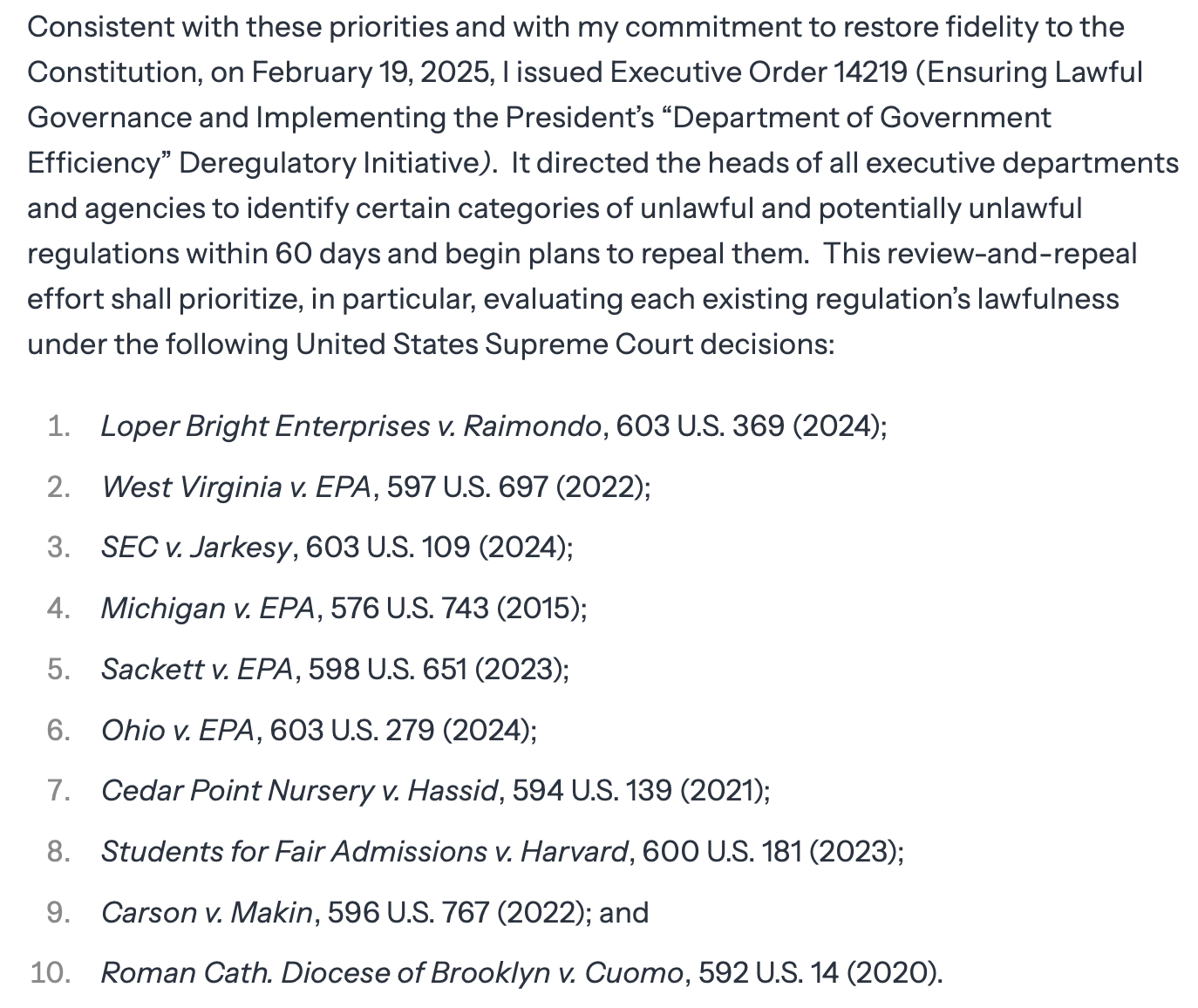President Donald Trump this week issued a sweeping directive ordering federal agencies to repeal regulations that conflict with recent Supreme Court rulings.
The directive in part allows agencies to leapfrog the traditional public notice and comment process and accelerates what Trump called a necessary “course correction” in the administrative state.

“Agencies thus have ample cause and the legal authority to immediately repeal unlawful regulations,” Trump wrote in the executive order, citing the “good cause” exception in the Administrative Procedure Act. That exception allows agencies to bypass standard procedures if doing so would be “impracticable, unnecessary, or contrary to the public interest.”
The directive, issued just days before a 60-day deadline set in Trump’s Feb. 19 order requiring agencies to identify potentially unlawful rules, builds on major Supreme Court decisions that have reshaped regulatory power — most notably Loper Bright v. Raimondo, the 2024 decision that ended judicial deference to federal agencies.

“In recent years, the Supreme Court has issued a series of decisions that recognize appropriate constitutional boundaries on the power of unelected bureaucrats,” Trump wrote. “Yet, despite these critical course corrections, unlawful regulations… remain on the books.”
Some agency heads are already tackling regulations. Housing and Urban Development Secretary Scott Turner, for example, pointed to early momentum already underway during an interview Friday with Fox News Business.
“Within two weeks we took down a very burdensome regulation called the Affirmatively Furthering Fair Housing rule,” Turner said, calling it a top-down zoning mandate from Washington that interfered with local control. “Washington doesn’t pick winners and losers — the states do. We put the power [and] flexibility down to the localities.”
GianCarlo Canaparo, senior legal fellow at the Heritage Foundation, told the Washington Examiner the administration is sending a wake-up call to federal agencies long resistant to reform.
“I look at the list and I see a lot of cases that not only implicate major Trump administration policies, but that also challenged a lot of long-standing agency practices,” Canaparo said.
He said the Trump directive is essentially a message to the federal bureaucracy to stop dragging its feet, because “agencies are notoriously slow to adjust to new case law unless they’re forced to by direct legal challenges.”
“We’re not waiting around to get sued — we’re going to start looking hard at whether what we’re doing is still lawful in light of these rulings,” Canaparo said, noting the administration is telling agencies, “‘Hey, wake up. There are Supreme Court decisions out there that directly impact your daily operations.’”
Carrie Severino, president of the conservative judicial advocacy group JCN, said Trump’s move is a a logical consequence of the Supreme Court’s rulings on government power from recent years.
“If the Court declares a regulation to be unlawful, the government doesn’t have to give notice and comment to rescind it,” Severino said. With the memorandum, “Trump is simply making sure that the Supreme Court’s holdings are applied consistently throughout the federal government,” she added.
An administration official indicated to the Washington Examiner that all agencies across the board are in line with Trump’s request. “I don’t think we have any friction from any agency heads on this issue,” the official said.
Among the rulings Trump cited are West Virginia v. EPA (which restricted agency authority to regulate greenhouse gases), SEC v. Jarkesy (which curtailed administrative enforcement powers), Ohio v. EPA, Students for Fair Admissions v. Harvard, and others that weakened the legal foundation for sweeping federal regulations, environmental protections, and affirmative action and diversity, equity, and inclusion efforts.
Supporters say the move is long overdue.
“This new initiative goes beyond platitudes … by specifically invoking ‘deconstruction’ of an administrative state now largely regarded as unconstitutional,” said Wayne Crews of the Competitive Enterprise Institute.
But opponents argue the administration is overstepping.
“President Trump is not a king,” said Lisa Gilbert of Public Citizen. “He cannot simply roll back regulations that protect the public without going through the legally required process.”
CHEVRON DECISION SET STAGE FOR TRUMP 2025 AGENDA
Democracy Forward’s Skye Perryman vowed legal action.
“The policies and programs that have served communities for decades cannot be undone with the arbitrary stroke of a pen, despite what this president may wish,” Perryman said.
Whether courts ultimately validate this interpretation of the APA remains to be seen. But with key Supreme Court wins in hand, Trump isn’t waiting for lawsuits — he’s rewriting the rulebook now.
























